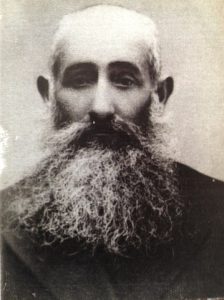
Jacob/Yokale
Hertsig/Hercyk
Excerpted and edited from Streets and People in Ostrovtse by Shmuel Shtraytman, Ostrowiec Yizkor book, 1971-Pg. 148
Born in 1876 in Ostrowiec [son of Yedidya and Rivka Hercyk *] , Jacob Hertsig directed the Loving Kindness Loan Society along with his wife Ester–Rokhl [Rosenberg*]from Lodz, an institution in itself.
Every Shabbat in the morning after services you could see him with his helpers going from house to house with big baskets and calling out, “A gut Shabbos Yidn! Help your poor brothers and sisters!” The baskets were quickly filled by kind–hearted housewives, with Shabbos braided Challas (bread) that were later distributed among the needy families in a discreet manner, in order not to shame them.
Visiting the sick was Yokale's second activity. He and his friends would sit whole nights long with the sick when their housemates were too tired from continually caring for them. The group also borrowed various sanitary and medical supplies for free, for the sick who were not in a position to pay.
Yokale Hertsig fell as a martyr during the deportation from Ostrovtse: he came out into the street wearing his talis un tfilin and the German murderers shot him that way.
*- Source from his grandaughter Myrna Herzog Feldman
More family info can be seen here

--------------------------------------
In the book “Sobreviver” by Sophia Débora Levy (“Survive” – 2nd edition, Editora Mauad, Rio de Janeiro, 2022), containing 9 testimonies of survivors of the Shoah, my father Leon Herzog describes the fate of his father, Yankele Hercyk (pp.32-33). I have translated it:
“The Germans announced that at the dawn of the 10th of December 1942, all Jews should leave their homes and gather on a large football field. And they could only carry a package on their backs with a few belongings. This was the first horrible thing that happened, because there took place a selection of the city's Jews. That day they practically cleaned up the city where Jews still lived spread out, and concentrated them on that soccer field, there they started to separate them: the young people who had a work permit were removed from there and the others stayed on that soccer field for 4 days, even with children, ill people, without water or food. In the following days thousands of people died. Near the cemetery a large common grave was made where the Jews themselves buried the dead. Later a large part of these people was taken to the train station where they began to be loaded into cattle cars heading to concentration camps.
On the day they deported people onto the trains, my two brothers Pinchas and Samuel with their families, their small children and wives, were taken to the concentration camp, like everyone else in the same situation. Before reporting to work with the other young people, I had hidden my father and mother in the attic, waiting for that situation to pass. I showed up on the soccer field because I had a work permit and I was taken with the other workers to a steelworks.
But my father did not stand long, there in the attic. He went down and stayed at home and my mother remained in the attic. The next day, Gestapo policemen, with the help of the Jewish Police who were obliged to accompany them, started to go from house to house looking for those who had not presented themselves. When they arrived at our house, they found my father wearing a talit (ritual shawl) praying and with the Torah (Bible) in his hands, as if he were already waiting for the arrival of the Gestapo. And they shouted: “Raus!” which means “Get out!”. My father replied: ”No. If you want to kill me, kill me here, I'm not going to the concentration camp.” Then they took him outside, dressed in his talit, and they shot him. They killed him on the spot. This was told to me by the guards of the Jewish Police who were accompanying the murderers of the Gestapo.”